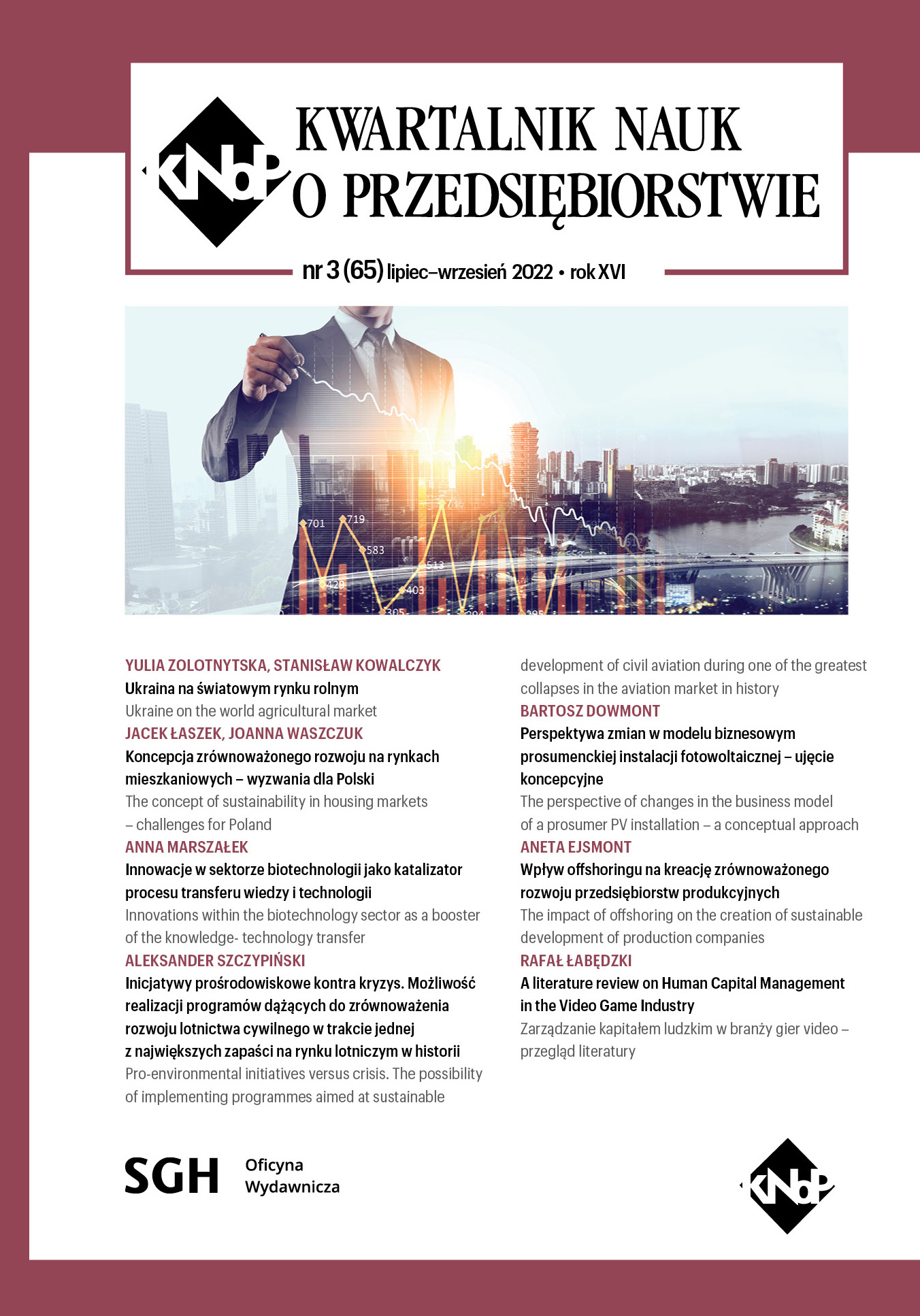The perspective of changes in the business model of a prosumer PV installation – a conceptual approach
Main Article Content
Abstract
The road to climate neutrality by the European Union initiates changes
in the legal acts of the Member States, including Poland, which contribute to the transformation
of current business models in the energy sector. The draft act amending the
act – energy law and the act on renewable energy sources changes the perception of
the electricity prosumer, turning him into an active participant in the energy market.
The aim of this article is to propose the concept of a new prosumer business model
using the business model canvas tool. The article analyzes the current conditions of
the functioning of the home micro-installation business model in order to successively
adapt it to the new business environmental conditions resulting from the draft act.
The research procedure allowed for the creation of the concept of the business model
of the emerging prosumer, indicating significant directions of changes in the sector,
depicted in the nine blocks constituting the business models. In the event of a positive
conclusion of the legislative process, from 2022, future prosumers will be obliged
to adopt a new business model, while the so far operating on the market will maintain
the obtained support model until the end of its duration. The study may be used
in further attempts to adapt business models to the applicable regulations, both on
theoretical and practical grounds.
Downloads
Article Details
The author of the article declares that the submitted article does not infringe the copyrights of third parties. The author agrees to subject the article to the review procedure and to make editorial changes. The author transfers, free of charge, to SGH Publishing House the author's economic rights to the work in the fields of exploitation listed in the Article 50 of the Act of 4 February 1994 on Copyright and Related Rights – provided that the work has been accepted for publication and published.
SGH Publishing House holds economic copyrights to all content of the journal. Placing the text of the article in a repository, on the author's home page or on any other page is allowed as long as it does not involve obtaining economic benefits, and the text will be provided with source information (including the title, year, number and internet address of the journal).
References
Bellman R. i in. (1957), On the Construction of a Multi-Stage, Multi-Person Business Game, Operation Research.
Brzóska J. (2016), Modele biznesu innowacyjnej energetyki, „Studia Ekonomiczne”, 280.
Chesbrough H., Rosenbloom R. (2002), The Role of the Business Model in Capturing Value from
Innovation: Evidence from Xerox Corporation’s Technology Spinoff Companies, Industrial and Corporate Change, 11 (3).
Dz.U. 2021 poz. 610 (2021), Tekst jednolity dla aktu Ustawa z dnia 20 lutego 2015 r. o odnawialnych źródłach energii.
Dz. U. WE 2009 L. 140/16 (2009), Dyrektywa Parlamentu Europejskiego i Rady 2009/28/WE z dnia 23 kwietnia 2009 r. w sprawie promowania stosowania energii ze źródeł odnawialnych zmieniająca i w następstwie uchylająca dyrektywy 2001/77/WE oraz 2003/30/WE, Official Journal of the European Union.
Gassmann O., Frankenberger K., Csik M. (2017), Nawigator Modelu Biznesowego: 55 modeli, które zrewolucjonizują Twój biznes, Gliwice, OnePress, „Polityka Energetyczna”.
Gołębiowski T. i in. (2008), Modele biznesu polskich przedsiębiorstw, Oficyna Wydawnicza, Szkoła Główna Handlowa wWarszawie.
Komisja Europejska (2020), Europejskie Prawo o klimacie.
Konieczna I. (2015), Model biznesowy spółdzielni a model biznesowy przedsiębiorstw o innej formie organizacyjno-prawnej: różnice, odrębność czynników sukcesu, Difin, Warszawa.
Magretta J. (2002), Why Business Models Matter, “Harvard Business Review”.
Minister Klimatu i Środowiska (2021), Projekt rozporządzenia Ministra Klimatu i Środowiska w sprawie systemu pomiarowego.
Ministerstwo Klimatu i Środowiska (2021), Polityka energetyczna Polski do 2040 r.
Nogalski B. (2009), Modele biznesu jako narzędzia reorientacji strategicznej przedsiębiorstw, “Master of Business Administration”, 2.
Obłój K. (2001), Modele biznesowe: Operator i Integrator, „Przegląd Organizacji”.
Osterwalder A., Pigneur Y. (2012), Tworzenie modeli biznesowych: podręcznik wizjonera, Wydawnictwo Helion (Onepress Exclusive), Gliwice.
Osterwalder A., Pigneur Y., Tucci C. L. (2005), Clarifying Business Models: Origins, Present, and
Future of the Concept, “Communications of the Association for Information Systems”, 16 (July).
Porter M. (2006), Przewaga konkurencyjna: osiąganie i utrzymywanie lepszych wyników. Gliwice, Wydawnictwo Helion (Onepress VIP).
Rappa M. (2001), Business models on the Web, Managing the digital enterprise, http://digitalenterprise.org/models/models.html (dostęp: 17.07.2021).
Soliński B., Stopa M. (2019), Model biznesowy funkcjonowania mikroinstalacji prosumenckich wykorzystujących odnawialne źródła energii, „Przegląd Organizacji”, 7, s. 16–22.
Stopa M., Soliński B. (2018), Modele biznesowe wytwórców energii w mikroinstalacjach a zmiany otoczenia prawnego w sektorze energetyki odnawialnej, „Polityka i Społeczeństwo”, 16 (16), s. 38–51.
Tomaszewski K., Sekściński A. (2020), Odnawialne źródła energii w Polsce – perspektywa lokalna i regionalna, „Rynek Energii”, (October).
UC74 (2021), Projekt ustawy o zmianie ustawy – Prawo energetyczne oraz ustawy o OZE (UC74).

